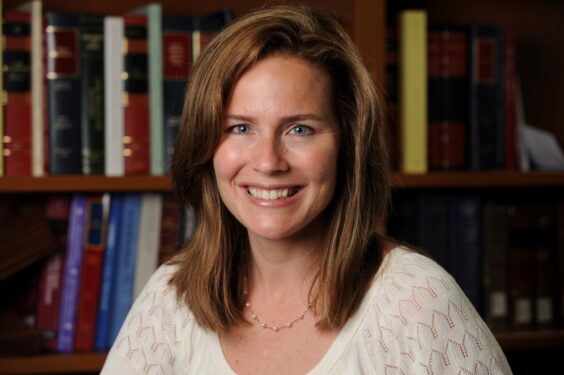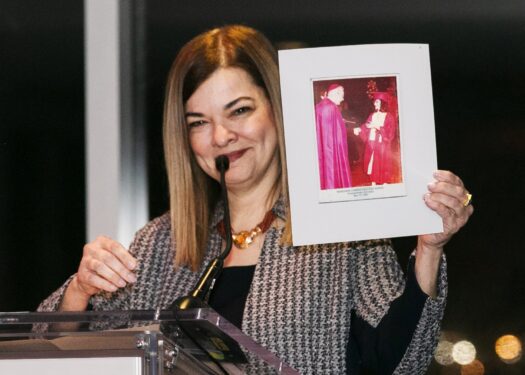
WINDSOR TERRACE — President Donald Trump turned up the heat on the already-contentious 2020 Election with a vow to nominate the next U.S. Supreme Court justice by the end of the week.
Trump declared his intentions over the weekend after Justice Ruth Bader Ginsburg died of pancreatic cancer Friday. Political observers and the media have widely reported that Trump has a shortlist of nominees including two federal judges — both women, both Catholic.
Most of the attention so far has gone to Judge Amy Coney Barrett of the 7th Circuit Court of Appeals, stationed in South Bend, Indiana, where she formerly taught law at the University of Notre Dame.
The other is Judge Barbara Lagoa of the U.S. Court of Appeals for the 11th Circuit in Miami.
An announcement of the nomination could come by week’s end, but certainly, not before Justice Ginsburg’s funeral, Trump said Monday morning.
“I think it’ll be on Friday or Saturday, and we want to pay respect,” Trump told Fox and Friends.
Meanwhile, speculation swirls about Barrett’s and Lagoa’s Catholicism and how they would influence rulings on cases involving abortion, capital punishment, or same-sex marriage.
This development could be the spark that ignites an already smoldering election cycle, with abortion and other social issues adding more fuel to the fire.
“It just ramps it up further,” said political analyst Brian Browne, assistant vice president for government relations and adjunct professor of political science at St. John’s University. “They always refer to the ‘October Surprise,’ and we’re not even out of September yet.”
Trump has promised to nominate pro-life candidates to the nation’s highest court, and he said Saturday the next one likely would be a woman. He also wants Ginsburg’s replacement to undergo the Senate hearings and a vote before the election, not after, which is what many Democrats want.
But Trump said his 2016 election victory extends that responsibility to him and intends to run with it.
“We have an obligation, as the winners, to pick who we want,” Trump told reporters Saturday. “That’s not the next president. Hopefully, I’ll be the next president. But we’re here now.
“I’ve had a shortlist for a while. I think it’s the greatest list ever assembled.”
Barrett received national attention in 2017 during confirmation hearings for her nomination to the 7th Circuit Court of Appeals. Sen. Dianne Feinstein, D-Calif., and other members of the Senate Judiciary Committee pressed Barrett about her Catholic faith.
Barrett, as a law school student in 1998, co-authored an article in the “Marquette Law Review” that asserted Catholic judges ought to recuse themselves in capital punishment cases.
When senators asked if she would apply that reasoning in cases involving Roe v. Wade, Barrett responded Roe is the law of the land, and she would rule based on that.
According to a transcript of the hearing from CSPAN, Barrett told the senators, “My personal church affiliation or my religious belief would not bear on the discharge of my duties as a judge.”
Feinstein, however, was not convinced. “The dogma lives loudly within you,” the senator said. “And that is a concern.”
The Senate approved Barrett’s nomination to the 7th Circuit with a slim 55-43 vote.
Barrett’s name frequently came up while Trump was filling the Supreme Court seat that eventually went to Justice Brett Kavanaugh. Trump has made one other successful nomination to the Supreme Court — Justice Neil Gorsuch in early 2017.
Barrett’s demeanor during the hearings enhanced her reputation. Browne noted, however, that religious litmus tests are unconstitutional for selecting judges to the Supreme Court.
Article VI, Section III of the U.S. Constitution says no religious test shall ever qualify someone to any office, Browne said.
High-court nominees are best served by not saying in advance how they’d rule, “because that’s what justices are supposed to do,” Browne said. Gorsuch and Kavanaugh successfully followed that strategy during their nomination hearings, Browne added.
Barrett, 48, is married and mother to seven children, including two adopted girls from Haiti.
“Well,” Trump told the reporters of Barrett, “she’s very highly respected. I can say that.”
Lagoa, 52, also is married, and she has three children. She is the daughter of Cuban parents who fled the Castro regime.

Lagoa didn’t get the same grilling as Barrett during the nomination process, and the Senate approved her 80-15.
“She’s an extraordinary person,” Trump told reporters Saturday. “I’ve heard incredible things about her. She’s Hispanic and highly respected.”
Florida is one of the key battleground states sought by Trump in his re-election campaign. Analysts say a nomination for Lagoa will probably win him lots of votes in the Sunshine State.
Voters in Florida got a glimpse of Lagoa’s faith a year ago as she delivered the keynote speech at the Red Mass reception of the St. Thomas More Society of South Florida in Fort Lauderdale.
“My Catholic education instilled in me an abiding faith in God that has grounded me and sustained me through the highs and lows of life,” Lagoa said in an article about the event posted on the website of the Archdiocese of Miami.
“It is more than going to Mass every Sunday,” she added, “and to me at least, it means having a personal relationship with God that in turn informs how we treat others.”
